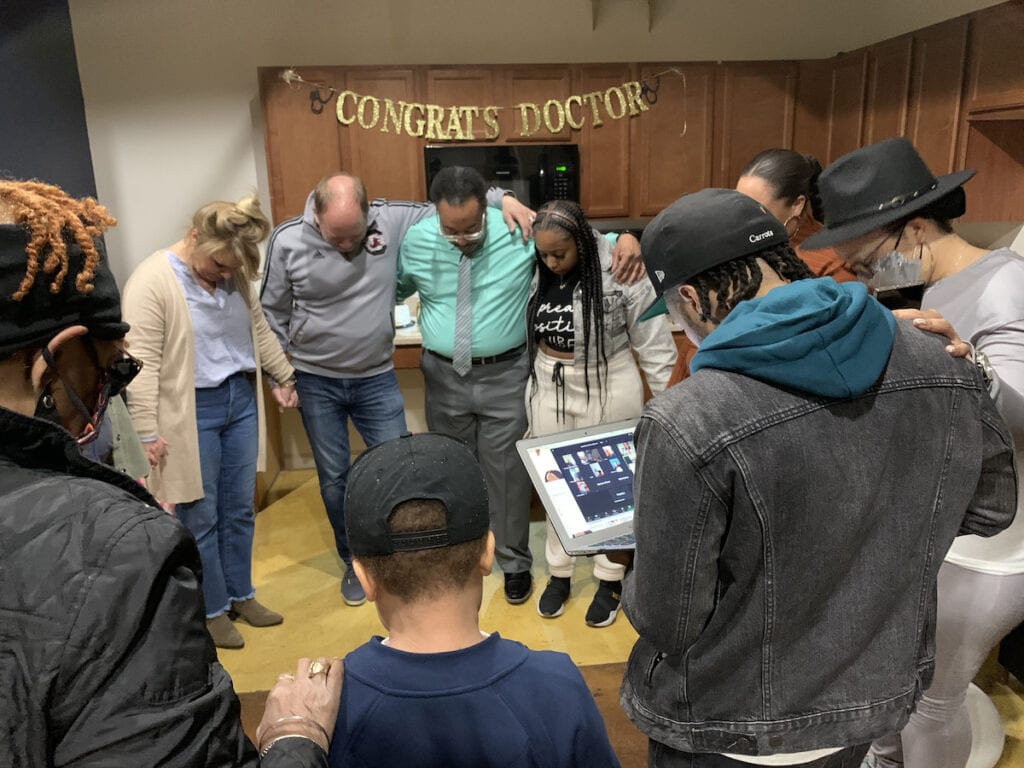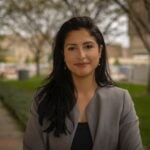When Rhonda Bayless’ mother got chemotherapy treatment for lung cancer, she would put on full makeup, her most luscious wig and most chic set of clothes.
Not to show off, she was in no mood for that.
“She felt like as a Black woman, she needs to present herself in a certain way so that she can receive a certain level of care,” Bayless said. “When you engage with the health care system [as a Black woman], you need to make sure that you look a certain way, so that they won’t treat you as some kind of other way.”
Bayless, executive director of the Center of Wellness for Urban Women in Indianapolis, says as Black women, she and her mother experienced their fair share of racism in the health care system.
One thing that helped improve that experience is having a Black doctor like her current OB-GYN.
That’s not to say that Black people are a monolith, she said.
“But being able to have certain conversations with her that I haven’t been able to have with other people,” Bayless said. “And having an understanding of what is happening with my body. If I say, ‘Oh, my job is stressful, because of microaggressions,’ she’ll go, ‘OK, I get that.’”
Still, there aren’t enough Black doctors to fill such demand. While Black Americans represent over 13% of the population, only 5% of doctors are Black.
Stark reality of classroom racism
Alejandro Mongalo will soon be one of them.
He’s finishing his final year as a medical student at Indiana University School of Medicine. He will then start working as a resident physician of internal medicine at Charles R. Drew University of Medicine and Science in Los Angeles, where he grew up.
Holding back tears, he said he is the first doctor in the family — and nothing about this journey was easy.
Mongalo’s mother is Black and his dad is a Latino immigrant from Nicaragua. As a child, he was surrounded by a diverse Black and brown community that was suffering from a wide range of health disparities.
Despite being groomed by his mom since middle school to become a scientist, Mongalo started out as a model and actor. He then founded a real estate firm to help lower-income community residents navigate housing options.
As he approached his 30s, he had a reckoning.
“When I was making the most money … I felt the most inner turmoil and emptiness,” Mongalo said. “I felt like I wasn’t really fulfilling a purpose that was truly impacting my community as greatly as I wanted.”
He realized becoming a doctor was his true calling, but it took two years to get accepted to medical school. What helped him the most, besides tenacity and hard work, was the mentorship of Black academics who steered him toward preparatory programs offered by historically Black colleges.
Mongalo said Drew “had a structured program and that was how I finally got to be in an environment where people who look like me would be supported and I was able to continue to get the mentorship that I desperately needed.”
He finally got accepted to Indiana University School of Medicine. When he thought the uphill battle was coming to an end, he was faced with a stark reality at IU’s campus in Terre Haute.
“From the very beginning I felt like I stood out,” Mongalo said. He also felt a pervasive racism, both inside and outside the classroom.
People would tell him to speak English when he phoned his Spanish-speaking grandmother.
And he recalled a troubling classroom discussion about how some genetic characteristics may lead to certain ailments and diseases.
“A student said, ‘Oh, this is probably the reason why we should have tighter immigration control, because all the people coming from out of this country bringing all their diseases into our country.’
“And those kind of comments when they’re not checked in the classroom by the professor, or they are engaged with comical banter with other students or the professor, that is when a person like me who has immigrant family, who has people from out of this country, feels not only hurt, but I feel excluded.”
Mongalo’s experience is not an anomaly. A study published in the New England Journal of Medicine shows 17% of medical residents in surgical programs in the U.S. face racism. Many choose not to report it for fear of retaliation, including through poor evaluations.
Mentorship as a savior and guide
It all took a toll on Mongalo’s mental health and at times he considered quitting. But at the hardest times, he found people at IU who would stand by him. One is Antwoine Haywood, assistant dean of students at the medical school and assistant professor of radiation oncology.
“The first thing that people notice is the spelling of my name, compared to other Antoines, it’s misspelled and this comes down to the fact that I grew up with a mother who was an immigrant and had a sixth-grade education,” he said. “And I have six siblings and I lost my father to gun violence.”
Haywood, who also is Black, holds a Ph.D. and is engrossed in the way the medical system treats underrepresented scientists and physicians. He understands what Mongalo has been going through.
Going into medical sciences, he, too, felt like an outsider. Until his mentor posed a question matter-of-factly: “He asked me, ‘When are you getting your Ph.D.?’” Haywood recalled. “I was like, ‘What? Me? Ph.D., how?’ It was his question that made me feel like this is real. It is something I can do.”
Having experienced the importance of mentorship, Haywood tries to give back to IU’s Black students.
At IU, new task forces are looking at ways to strengthen equity. Haywood said there are a lot of honest conversations underway to make health equity and diversity “part of the institutional fabric, not just a one-off initiative.”
Navigating challenges
Another of Haywood’s mentees is Jamel Hill, a Black medical student in his fourth year at IU.

Hill also said he has faced microaggressions and racism — inside the classroom and while working at the hospital. Twice, a white patient told a doctor or nurse that they did not want “the Black doctor” to see them.
“And I often … maybe for lack of a better explanation, just push that off to ignorance,” he said.
Geoffrey Young of the Association of American Medical Colleges said some progress is being made but it is not nearly enough. To improve the medical system, he said there must be changes to the barriers that affect Black and brown communities’ access and success in higher education.
“Some of the systemic barriers are inequity in education, or quality of education, inequities in access to health care, and other issues that are really systemic and part of systemic racism,” said Young, the association’s senior director for student affairs and programs.
Young and his colleagues advise member schools about the importance of using holistic admissions processes that go beyond standardized testing.
“To not only look at that applicant’s metrics like their MCAT score and GPAs,” he said. “But also look at [the applicants’] experiences and attributes, and how their presence and their skills and experiences will likely enrich and enhance the learning environment.”
Despite all the hardships, Hill just landed his dream job as a resident physician of physical medicine and rehabilitation in the University of Kentucky. He starts in about three months and will be the second doctor in his extended family.
“I think for me, it was really important to show the people who are coming behind me that we can do this, you can do this, everything that you need is already within you,” he said.
This story was reported as part of a partnership between WFYI, Side Effects Public Media and the Indianapolis Recorder. Contact Farah Yousry at fyousry@wfyi.org or 857-285-0449. Follow her on Twitter @Farah_Yoursrym.







